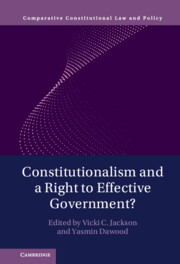Book contents
- Constitutionalism and a Right to Effective Government?
- Comparative Constitutional Law and Policy
- Constitutionalism and a Right to Effective Government?
- Copyright page
- Dedication
- Contents
- Tables
- Contributors
- Acknowledgments
- Part I Introduction
- Part II What Are Constitutions For?
- 2 Resolution and Accommodation in the Good Constitution
- 3 Effective Governance and the Social Dimension of the Rule of Law
- 4 Effective Government and the Two Faces of Constitutionalism
- 5 The Right to Effective Self-Government
- Part III Positive Rights and Rights to Effective Self-Government
- Part IV The Role of Courts in Building State Capacity and Promoting Effective Self-Government While Protecting Rights
- Part V Executive and Administrative Constitutionalism in Effective Democratic Government
- Part VI Legislatures, Representation, and Duties of Effective Self-Government
- Part VII Politics, Sociology, Media, and Corruption as Contexts for Constitutionalism and Governance
- Index
5 - The Right to Effective Self-Government
from Part II - What Are Constitutions For?
Published online by Cambridge University Press: 20 October 2022
- Constitutionalism and a Right to Effective Government?
- Comparative Constitutional Law and Policy
- Constitutionalism and a Right to Effective Government?
- Copyright page
- Dedication
- Contents
- Tables
- Contributors
- Acknowledgments
- Part I Introduction
- Part II What Are Constitutions For?
- 2 Resolution and Accommodation in the Good Constitution
- 3 Effective Governance and the Social Dimension of the Rule of Law
- 4 Effective Government and the Two Faces of Constitutionalism
- 5 The Right to Effective Self-Government
- Part III Positive Rights and Rights to Effective Self-Government
- Part IV The Role of Courts in Building State Capacity and Promoting Effective Self-Government While Protecting Rights
- Part V Executive and Administrative Constitutionalism in Effective Democratic Government
- Part VI Legislatures, Representation, and Duties of Effective Self-Government
- Part VII Politics, Sociology, Media, and Corruption as Contexts for Constitutionalism and Governance
- Index
Summary
Protecting individual rights is a core feature of democratic constitutionalism. The centralization of the means of coercion gave rise to the Hobbesian dilemma, the fear that this enormous power might be abused unless it be effectively controlled. In addition to dividing power among different branches of government or sharing it between the federation and its units, constitutions have fortified individual rights with judicial review and enforcement mechanisms against the executive branch to rein in state power.
Proposing a collective right to effective self-government sits oddly with a vision that pitches free individuals against an all-powerful state. Such a right can, however, be justified on two interrelated grounds. First, in the absence of effective protection by a state, individual civil and political rights remain empty declarations. Stateless people, Hannah Arendt has taught us, are the most vulnerable; they have no legal rights and no way of seeking protection as a matter of right.
- Type
- Chapter
- Information
- Constitutionalism and a Right to Effective Government? , pp. 60 - 70Publisher: Cambridge University PressPrint publication year: 2022

